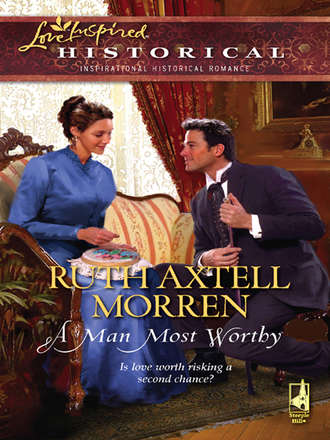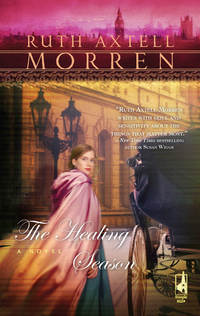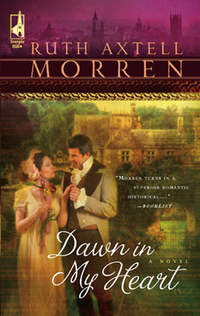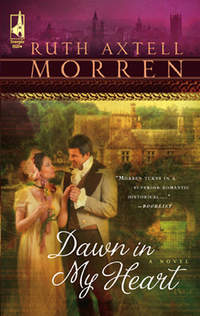
Полная версия
A Man Most Worthy
“You came!” She stopped about a foot from him, her smile wide. In that instant, all his doubts evaporated like the dew in the warm morning sun. He didn’t doubt the welcome on her face; she was too young to have learned to mask her feelings.
He found himself caught once again by her beauty. She had the most exquisite features, delicate and perfectly formed like a porcelain doll’s—pink-tinted cheeks, a perfect little nose, lips a deeper pink than her cheeks, her teeth white and even. Her heart-shaped face was framed by those silky locks of hair.
Then he looked down at the damp grass, remembering his ignorance of the game. “Yes.”
“Have you really never played tennis before?”
Did she think the average person indulged in tennis? How little she knew of life. His eyes met hers again, expecting to see triumph, but only simple interest was visible in those blue depths. “No.”
“Very well, let’s get started. I imagine you haven’t much time.”
“You imagine correctly.” What was he doing here? He should be finishing breakfast and going to his desk.
“I brought an extra racket, in case you decided to come.” She slanted him a friendly smile as she spoke, leading the way to the edge of the court.
She picked up a racket from a white wrought iron chair and a wire basket full of rubber balls. “You take this side of the net. Stand in the middle since we’re playing singles, and I’ll go on the other. I shall serve to you and you try to hit the ball back to me. Just follow my motions.”
Still amazed that she wanted to teach him, he took the racket from her and gripped it in his hand. It didn’t weigh much, its handle made of wood and wrapped in leather at the base.
She hit the ball with an underhanded swing and it came over the high net toward him. He didn’t even have to move to reach it. He swung with all his might and with a sense of triumph connected with the ball. Instead of going back over the net where he expected it to, it flew up toward the sky and landed back on his side of the net, skittering away in a series of small bounces.
His face flamed at her laughter.
“You needn’t hit it quite so hard to return it across the net,” she said in a kind tone. “Also, a lot depends on the angle of your racket when you hit the ball. Let’s try again, shall we?” She stooped and grabbed another ball from her basket.
He gripped the racket, determined to hit the ball over the net this time. He controlled his swing, barely tapping the racket against the ball and sent it dribbling into the net.
“That’s better,” she said, no hint of laughter in her voice. “Let’s try another.”
She continued sending balls his way. He missed as many as he managed to hit, but she continued encouraging him with every one.
Then he began to catch on and managed to send more balls back to her. Gradually he gained confidence because Miss Shepard was so patient and encouraging. He enjoyed watching her vitality as she ran across the court, so unlike the passive stance of the other women he’d glimpsed on the court at other times in the day. Perhaps it was because she was still a girl. She had not yet assumed the airs of a young lady just come out. Even the perspiration making her face shine appealed to him.
In some ways she reminded him of the girls of his boyhood. In their ragged frocks and bare feet, there was no room for stiffness and formality. They ran and skipped about, unfettered by social constraints or petticoats and high-buttoned shoes.
She continued sending balls his way a while longer. He was beginning to think it a tame sport when a ball went flying over the net so fast it made a whooshing sound as it cut through the air. He had to sprint to connect with it. He just made it and sent it back over.
She laughed as she went running for it. “This is the way I prefer to play!” Again, it came hard at him, and he had to jump to the side to reach it. He missed it.
“I see.” He retrieved the ball and returned to his place. He swung hard at it and again, the ball went too high.
“I’m over here, you know!” Laugher bubbled in her voice.
He winced in embarrassment at his overconfidence. Before he could run after the ball, she had gone for it. This time she resumed her gentler game. “I think we need to practice a bit more before you’re up to my speed.” The words were said to him in a friendly manner but he took them as a challenge, vowing to find a way to master this game.
Beads of sweat rolled down his temples as the sun grew warmer in the sky. At that moment, she picked up the ball and strolled to his side of the court. “You really need proper tennis garments. You must be sweltering in your suit. Why don’t you take off your coat?”
He mopped his brow, thinking how unpolished he must look compared to the suave young men she’d played with yesterday. Instead of removing his coat, he snapped open his watch. “I really must go. I need to get to work.”
She nodded, though her down-tilted face and puckered lips expressed disappointment. Then she brightened. “Have you breakfasted?”
He shook his head.
“I haven’t either. Come, you must be as hungry and thirsty as I am.” Before he could refuse, she was walking off the court. “Leave the racket here. I’m sure someone will be out to play later. Hurry, I’m famished!” She waited for him to catch up to her and the two walked back to the house.
Her next words surprised him. “Are you from London?”
He wasn’t used to anyone taking a personal interest in him. “No. I grew up in Birmingham.”
She tilted her head. “That’s funny. You haven’t any accent that I can tell.”
“That’s because my mother was—” He bit his tongue, he’d almost said “a lady.” He hesitated. “From Kent.”
She smiled. “Not far from here?”
“A bit. She was born in Whitstable.”
“Ah, by the sea.”
He found her blue eyes fixed on him as if waiting for more information. “She was a governess before she married my father.” He looked away. “He was a miner.”
“Oh.” The single note was filled with wonder. “However did they meet?”
“She was working with a family up there and had left them.” Refusing the master’s advances, he added mentally. “She had begun a small school for the miner’s children.”
“And she met your father!” Her eyes gleamed in excitement. “Oh! Love at first sight, I bet it was.”
He looked straight ahead of him, amused and irritated at the same time by her romantic schoolgirl notions. “He died when a mine shaft collapsed, leaving my mother to raise four sons. He was a widower, when they met. His two boys were at the school. Then my brother and I came along.”
“How sad,” she said softly. “My mother died giving birth to me.”
He looked sharply at her. Her tone was almost casual. “I’m sorry,” he said finally, feeling the inadequacy of the words.
“Oh, it’s all right. It happened so long ago. Tell me what happened after your father died.”
He took up the thread of his own history, his mind still on her motherless condition. “My mother moved us into town, where she found work in a mill.”
Miss Shepard was silent for only a moment. No doubt she’d lost interest by now. “And when did you come to London?”
He smiled at her persistence. No one from her station had ever asked him about his origins. “When I was fifteen, my mother gave me five pounds she had saved and bought me a rail ticket to London. I found work at a bank. I was good with numbers, you see. Numbers and letters. She’d made sure we all received learning.”
“And now you’ve become my father’s private secretary?”
He nodded.
“That’s good. Poor old Simpson is becoming forgetful, I’ve heard. He’s been with Father forever!”
They reached the house and he held the door open for her then followed her into the breakfast room. He still hadn’t gotten accustomed to the fact that there were separate rooms for breakfasting and dining—and that most in the household took their breakfast in bed.
He stopped short at the threshold of the breakfast room at the sight of his employer. Mr. Shepard was seated squarely behind The Times and Nick debated a few seconds what to do. Retreat? Go forward as if accompanying the man’s daughter were the most natural thing in the world?
Before he could decide, Miss Shepard breezed in ahead of him. “Good morning, Father. You’ve beaten us down to breakfast.” She leaned over and kissed him on the cheek.
“What are you doing about so early?” He glanced over his paper, then lowered it further when he caught sight of Nick. Nick greeted him, hesitating at the doorway. The man gave a mere nod in acknowledgment and turned his attention back to his young daughter.
“I was just practicing tennis. Look whom I found.” She turned to Nick. “He hasn’t breakfasted either, so I brought him along. What will you have, Mr. Tennent?” Before her father could say anything, she moved to the sideboard and began lifting lids. “There’s scrambled eggs, kedgeree, bacon…”
Mr. Shepard grunted and turned back to his paper.
Nick followed to the serving dishes and took up a plate. The girl had succeeded in distracting her father from any mention of tennis lessons. He pondered her adroit maneuver as he helped himself to the wide array of food. His own boarding house fare usually consisted of lumpy porridge and a weak cup of tea.
Concentrating on his food, Nick listened to Miss Shepard chattering away to her father. He answered in monosyllables, with an occasional “What’s that you say?” thrown in, but he never lowered his paper more than a fraction.
Nick marveled at how Shepard could have produced such a lovely creature—and not realize what a treasure he had. Poor motherless child. He knew she had a much older brother. Nick had seen him a few times at the firm—Mr. Geoffrey Shepard, a pompous man in his late twenties.
Miss Shepard leaned forward, setting down her knife and fork. “Did you hear me, Papa?”
“What’s that you say?”
“I said we are planning an excursion to Richmond Park. Can you not come?”
“I return to London this afternoon. Take Miss Bellows with you.”
Nick knew he referred to a companion of sorts he’d briefly met in the servants’ quarters. His gaze rested in sympathy on Miss Shepard’s crestfallen features. He turned with a start to find Mr. Shepard focused on him, his gray-blue eyes sharp and piercing. “I’ll need those figures on Henderson, Ltd. before I go.”
“Yes, sir.” Nick drained the last of his tea and stood. “I’ll get to it right away.”
Miss Shepard smiled at him. “So long, Mr. Tennent. Perhaps I shall see you tomorrow?” Her eyes told him she was referring to the tennis court.
“Perhaps. Good morning, Miss Shepard.” With a bow, he left the room.
Of course, he couldn’t join her again tomorrow. It was sheer folly…
Chapter Two
Awake since the sky had begun to lighten, Alice let out a massive sigh of relief when she saw Mr. Tennent walking across the lawn toward the court.
Not until that moment did she realize how disappointed she would have been if he hadn’t shown up. She’d prayed hard last night that he wouldn’t be discouraged after only one lesson.
She fingered the head of her racket as she watched his long stride. His serious air made Victor and the other boys of her acquaintance seem just that—boys! Biting her lip, she glanced down at her calf-length plaid skirt and sailor top. How she wished she were one year older and wore ankle-length dresses like a lady. Did Mr. Tennent see her as just a schoolgirl? She cringed, remembering the silly game of hide-and-seek she’d been playing the day she’d burst in on him.
She smiled as he approached her. “Good morning.”
He nodded, his dark eyes meeting hers, their formality lessening as he gave her a slight smile. “Good morning, Miss Shepard.”
She tilted her head. “Ready to have another go?”
“If you’ve the patience and fortitude.”
Her smile widened in relief. She handed him the extra racket. “You did very well for your first time. Come, I’ll serve first.”
“Very well.” He shed his coat this time and laid it carefully on a wrought iron chair by the side of the court.
She began gently, giving him a chance to review what she’d taught him the day before. They played for about twenty minutes before taking a break.
“I brought some water for us,” she said, leading him to the yew hedge where she had stashed two stone flasks. “It should still be cold.”
“Thank you.” He took the one she handed him then waited until she had uncapped hers and brought it to her lips before following suit. “How did I do today? Any improvement?” he asked, lowering the flask.
“Oh, a vast amount. You’re a natural athlete.”
He made a sound of disbelief.
“You don’t believe me? It’s the truth. I can tell. You’re nothing like most of the boys on the court who try and act as if they knew something.” She studied his face, hoping she was convincing him not to give up, but the steady way he regarded her was hard to read.
Mr. Tennent wiped his brow with his handkerchief, pushing back his dark curls.
Hoping to draw out more about his fascinating past, she said, “Tell me more about your mother.”
He looked away from her, and she bit her lip, afraid she had offended him. Her governess had always said she was too direct.
But he answered with no sign of displeasure. “She had to take us into the mill with her when we were young, and put us to work as soon as we could wind a thread around a bobbin.”
“She must have been a brave woman to raise four boys all alone.” His tale had haunted her last night. It had sounded so unbearably romantic.
He pocketed his handkerchief. He was standing in his vest and shirtsleeves. Even in his typical clerk’s attire, he stood out. There was something distinguished about him. “No matter how tired she was,” he continued in a quiet tone, “she always gave us a lesson after dinner in the evenings before we went to bed. She had saved a few school-books and one or two storybooks from her teaching days. Those and the Bible formed our only amusement at home.”
She pictured the cozy scene, a mother with her four boys surrounding her on a settee, or with her arms around them on a wide bed flanked by soft pillows. “It must have been nice to have a mother read to you at night.”
“Didn’t anyone ever read to you at bedtime?”
She blushed beneath his close scrutiny. “My nurse told me stories when I was very young, and then Miss Duffy, my governess, read to me when I was a little older.”
“I’m sorry you didn’t have a mother to read to you at bedtime,” he said softly.
His tone was so gentle it was as if he had known how lonely her childhood had been. Afraid he’d pity her, she set down her water bottle and picked up her racket. “Come on, let’s get back to our game before you have to work.”
He followed her out to the court. This time, she hit the ball a little harder and enjoyed watching him run to meet it. She, too, was forced to run across the court when he returned it equally forcefully. Laughing from sheer joy at the physical exertion, she swung at the ball and watched it clear the net.
By the time they finished their lesson, they were both red in the face, but never had she had more fun on the court.
“What about tomorrow morning?” she asked him, hoping she didn’t sound too eager.
“It depends on your father. I might be called back to London.”
Her shoulders slumped in disappointment. “Of course.” Trust Father to ruin her fun. “Do you think he’ll bring you back out again?”
“I have no way of knowing.”
“Well, if you should come back, I challenge you to a match.”
He nodded slowly, his deep set eyes looking into hers. “You’re on.”
As soon as he had a free moment back in London, Nick inquired of one of the clerks in the firm and found out where he could get tennis lessons. It meant money he could ill afford, and having to go across town to Regent’s Park, but he was determined the next time he faced Alice Shepard across the court, he would no longer be a clumsy novice.
He hadn’t been able to get the young girl out of his mind since he’d returned to the city, no matter how many times he’d told himself he was being silly to keep thinking about her.
But her smiling face wouldn’t leave his thoughts despite the effort he put into studying his employer’s files and tallying columns of numbers.
He’d never been in love. No young woman had yet caused him to veer from his single-minded focus on the path to success.
The feelings Miss Shepard elicited in him were a puzzle to him, not least because he didn’t know how to classify them. She was too young for it to be love, he felt. But if it wasn’t love, it certainly was a sort of obsession, which he’d have to eradicate sooner or later. He could ill spare time for such dangerous complications.
In the meantime, however, at a safe distance in London, he preferred to postpone the moment and content himself with daydreaming about her as he rode the early morning ferry to work, as he walked the distance to the office, as he made the return journey in the evening.
And every evening, after work and a light supper, he stood across the net from his new instructor, imagining Miss Shepard in his place. He’d spent part of his last salary on a lightweight pair of twill trousers and a linen jacket, vowing to look as dapper as any young gentleman when they next met.
Back and forth went the ball, the instructor calling out advice as he sent it across the net to Nick. Nick grew to enjoy the thrill of competition. He found it as thrilling as predicting the direction of the price of a company’s stock.
He remembered Miss Shepard’s words. You’re a natural athlete. Did it mean she’d actually looked past his shabby frock coat and seen something more than just her father’s secretary? He’d never thought of himself as athletic, even though until coming to London, he’d spent any spare moment outside when he wasn’t working in the noisy, dusty environment of the mill. But that was playing in the street with boys his age, with no sports equipment. A ball was a rotten cabbage, a cricket bat a broken chair leg. But even those had been few and far between as any piece of wood was quickly consumed in the stove, and extra food was rarely to be found.
Nick had no idea when and if he’d be going back to the Shepards’ country house, but he’d be prepared just in case, even if it cost him a fortnight’s wages.
He wanted to match Miss Shepard’s skill and show her he was a worthy opponent.
Each morning he joined the hundreds of anonymous young men clad in black frock coats and top hats hurrying down Fleet Street to their offices. He pulled open the brass-handled door, glancing a moment at the understated plaque to the right: Shepard & Steward, Ltd., Investments.
Some day it would read Shepard, Steward, Tennent, & Partners.
He hurried down the corridor to his office, nodding his head to the various clerks he passed. “’Morning, Harold. ’Morning, Stanley.” Rushed syllables as everyone hurried to his place in the maze of corridors and cubicles.
He entered the quieter sanctuary upstairs in the rear, the executive offices of the full partners. His own desk, situated in a small corner of an office he shared with the senior secretary, was neat, the way he’d left it the evening before.
Nick sat down and opened the file he’d been studying the previous day, glad for the momentary solitude. Mr. Shepard would expect a report by noon on the assets of the small factory, which manufactured iron fastenings.
“Shepard wants you.”
He looked up to find Mr. Simpson, the other secretary, walking to his own desk, the larger of the two in the room. The old man guarded his boss from all he considered intruders, including Nick.
Nick stood now and grabbed up his pad and pencil. “Yes, sir.”
The man stood by the doorway, as if to make sure Nick obeyed the summons. His bristly gray eyebrows drew together in their customary frown as Nick passed him with a curt nod.
Dark walnut wainscoting covered the walls of Mr. Shepard’s private office. Oil landscapes in heavy wooden frames lined the space above. Some day he would have an office like this one.
Shepard stood at a window overlooking the busy street below, his hands clasped loosely behind them. He turned only slightly at the soft sound of the door closing.
“Ah, Tennent, have a seat. I need you to take a letter.”
“Yes, sir.” Nick crossed the deep blue Turkish carpet and sat in the leather armchair facing the wide desk.
Mr. Shepard twirled his reading glasses in his hands. “This is to the Denbigh Coke Company, Denbighshire, Wales.
“Gentlemen—After a careful review of your firm, it is with regret that we inform you that we must decline the opportunity to offer you the venture capital you requested to expand your colliery. Although your firm’s net profits for the preceding year showed…”
Nick’s pencil hurried across the paper, his mind unable to suppress the satisfaction at Shepard’s decision. It mirrored the one Nick would have made in his place.
Mr. Shepard’s peremptory tone interrupted his thoughts. “Read it back to me.”
“Yes, sir.” He began at the top.
“Very good. I’ll sign it as soon as you have it ready. Make sure it goes in today’s post.”
Nick stood.
“I will be heading back out to Richmond this weekend. I have various projects that need catching up on. I trust you will be free to accompany me?”
Unable to help a spurt of excitement at the announcement, Nick’s fingers tightened on his pencil. It was quickly doused as he realized his employer would keep him too busy to allow him any free time for recreation. “Yes, sir.”
“Very good.”
Nick reached the door.
“Bring enough to stay a week.”
Nick turned slowly. A week in Richmond? His heart started to thump. “Yes, sir.”
An entire week in the same house as Miss Shepard. This time he couldn’t contain his excitement. He even began to whistle as he made his way back down the dark corridor.
Alice returned from church at noon on Sunday.
She stopped short in the doorway, her hands flying to her cheeks as at the sight of the tall young man emerging from her father’s library. “Mr. Tennent!”
To her further surprise, he smiled, looking as glad to see her as she felt to see him.
“When did you arrive?”
“Early this morning,” he said. “Your father was going to come Friday evening but was delayed with other engagements.”
She moistened her lip, trying to appear collected. “I—I’ve just come from church.”
“I see.”
An awkward silence ensued. Then her eyes widened in sudden horror. “Have you been working?”
He colored. “I was just going to read up on some documents.”
“On the Sabbath?” She couldn’t help the shock in her voice.
He looked away as if ashamed. “Yes.”
She frowned. “Father doesn’t forbid you from attending services, does he?”
“No, of course not. I…I’ve already been to services.”
“You have? I didn’t see you.”
“That’s because I attended chapel.”
“Chapel?” Her eyes widened in further shock as she understood his meaning. “You’re Methodist?”
His dark eyes seemed to hold a touch of defiance. “My mother was Church of England, but she attended chapel with my father.”
“Oh!” She wondered at the thought of a lady leaving her church for the lowly Methodist chapel for the sake of her husband. She thought of something. “Our cook, Mrs. Clayworth, attends chapel.”
“Does she?”
She bit her lip, afraid she’d offended him. Did he think she equated him with their cook? Actually, she’d always been curious about those attending this other sort of church. All she’d ever heard of Methodists was disdainful. The only one she knew, the cook, was firmly decided in her faith. “Maybe I can go with you some time?”
He drew back a fraction as if surprised. “Perhaps.” There was no encouragement in the reserved tone.








